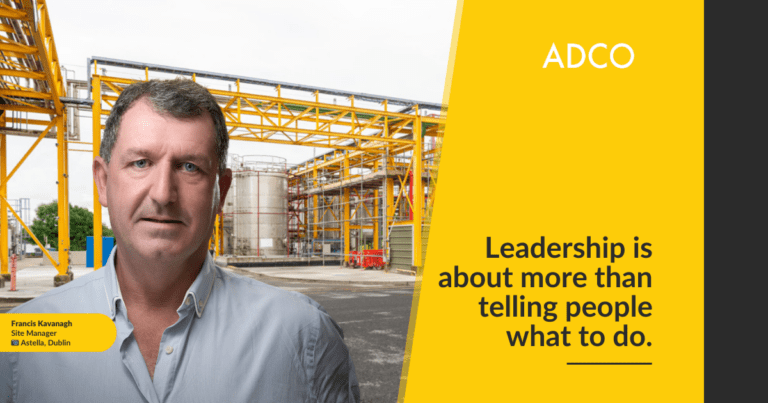Leadership is about more than telling people what to do.
To successfully deliver a construction project you need the best materials, tools, equipment and technology, but the most important element of all is people – in the shape of not only specialist knowledge, experience and expertise, but the leadership and management skills that bring it all together and keep a project on course, on schedule, and on budget.
In the past leadership might have been perceived as giving orders, but for a construction project to run efficiently and to plan, you simply can’t afford to have workers waiting around standing by for orders.
What you really want is team members who feel empowered to take the initiative in every facet of a project, and that requires leading by example – something that has come to be known as behavioural leadership.
Do as I do, not do as I say
In certain types of industries and workplaces, team members learn from how their managers lead and motivate them and, whether they know it or not, then incorporate those actions into how they behave.
Construction is such an industry with our workplace being one where everyone’s actions and behaviours are very visible. Remember the old saying, “Do as I say, not do as I do”? Well the reverse is what behavioural leadership is all about. It’s working and behaving in ways you want your team members to adopt.
Types of behavioural leadership
There are several styles of behavioural leadership, but there are three that work effectively on construction projects.
1. People-oriented leadership
These leaders are big on relationship building and open communication. It helps them to motivate their team members and inspire them to perform to a higher standard. They encourage collaboration and mentor team members, keeping an eye on their progress and rewarding their successes.
2. Task-oriented leadership
These leaders are all about setting goals and delivering results. They put strong processes in place, make sure instructions are super clear, and supply their teams with all of the information and guidelines they need to get the job done right first time.
3. Participative leadership
This type of leader includes their entire team in decision-making processes. They listen to everyone’s opinions and take on board feedback with the help of regular meetings, where each team member’s voice can be heard and considered for the next step of the project.
At ADCO, we practise a combination of these behavioural leadership styles, with the ratio of that combination depending on the nature of the construction project in question and the team members working on it.
Responsible leadership: ADCO fosters good mental health!
With long hours and hard work the norm in the construction industry, it’s common for people to struggle with their mental health, particularly when their work can often take them away from home. It’s also common in our sector for people to hide their feelings when they are finding it difficult to cope. At ADCO, we have a responsibility to make sure every member of our team returns home safely every day – physically and mentally.
Robert O’Reilly, ADCO EHS (Environmental Health and Safety) Manager, who experienced his own struggles, was instrumental in launching our ‘Mind Your Mental Health’ initiative. Through presentations, workshops, and talks with celebrity speakers on mental health issues, we created a culture of safety and openness where people could feel confident talking about how they feel. We also implemented an Employee Assistance Programme (EAP) to help employees and their immediate family with short-term counselling and referral services. This initiative picked ADCO up an Excellence in Health and Safety award at the 2022 Irish Construction Industry Awards.
Setting the right examples
Our behavioural leadership model means we can be confident that our team members care as much about the things that are important to our clients.
Our culture of safety: Over the last five years and more than 1.6 million work hours, there have been zero accidents or lost time on ADCO sites. This is down to the environmental health and safety (EHS) procedures we have in place, the lengths we go to eliminate hazards, and the way in which our entire team has embraced and lived out our commitment to safety.
Environmentally conscious: We minimise our carbon footprint wherever we can through waste reduction, energy efficiency and sustainable practices that adhere to the ISO 14001:2015 – Environmental Management System (EMS) standard.
Behavioural leadership empowers our team
Our core values help everyone at ADCO to not only grow and develop as problem solvers, but to nurture behavioural leadership in all of our team members.
Communication: We learn to listen carefully to each other’s needs, as well as those of our clients.
Solutions Focused: We always try to come up with new, innovative, and practical ways to solve problems, whether that’s on a project, professional or personal level.
Take Responsibility: We prove our trust in our people by giving them the opportunity to take on more responsibilities and grow their expertise.
Be Helpful: We support each other with the space to feel safe, both mentally and physically.
Commitment: We’re committed to creating an inclusive and diverse workspace where everyone’s background and ideas count, and where they can be comfortable being themselves.
Be Part of a Team: Because our team is small, everyone knows, trusts, and relies on each other.
Our team members are all leaders
Embracing behavioural leadership has meant that each of our team members is empowered to take the initiative and work to come up with solutions to overcome any challenges they face. This helps ADCO projects to run more efficiently, effectively and smoothly, and produce the kind of results our clients have come to expect from us.
If you’d like to know more about how we lead and manage at ADCO, and how that benefits us, our clients, and potentially your next project, contact the team at ADCO today.

